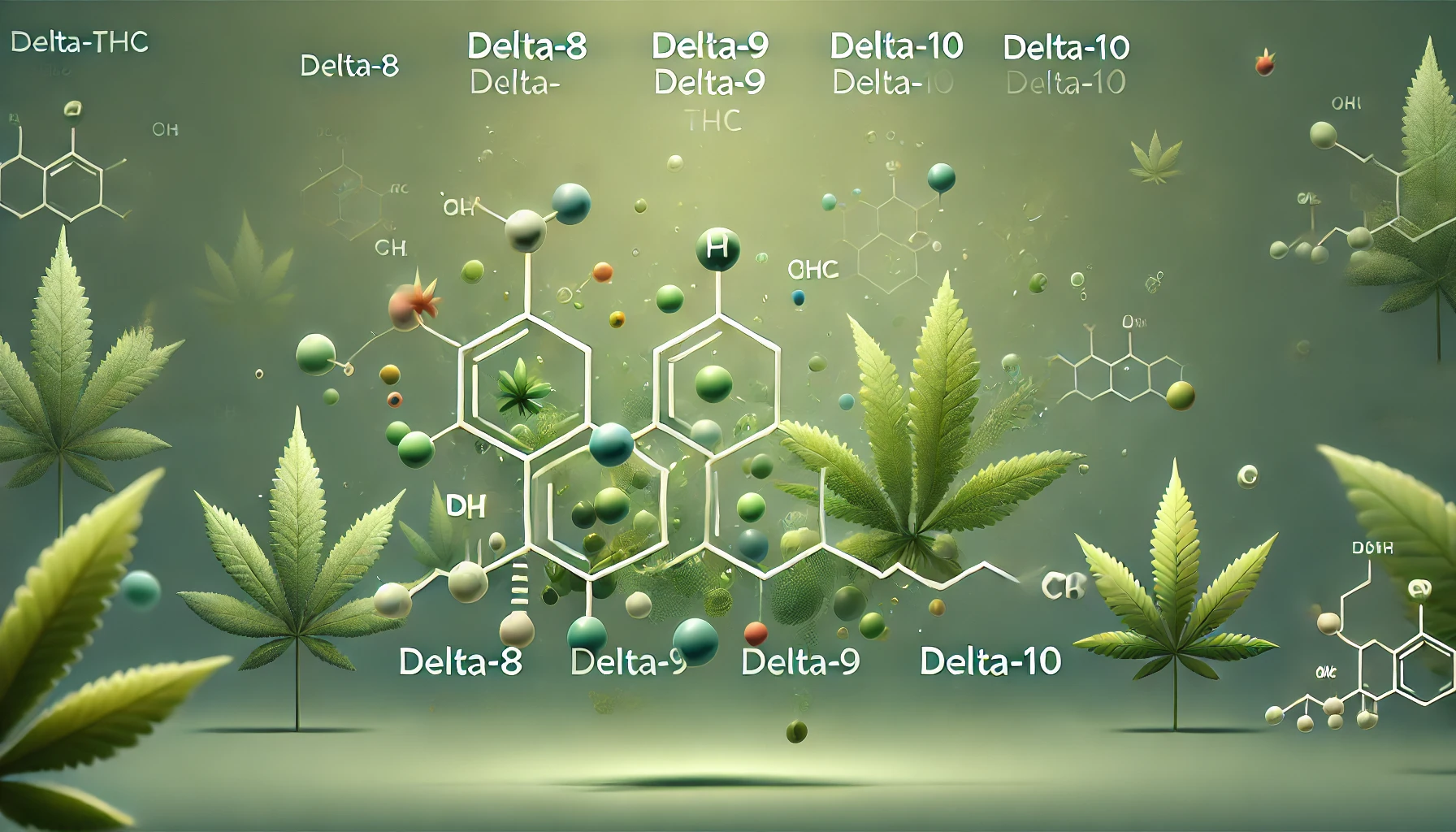Delta THC: Understanding the New Wave of Cannabinoids | Health Benefits, Legal Status, and More
Introduction
Delta THC is rapidly emerging as a popular alternative in the cannabis industry, capturing the attention of both consumers and regulators alike. This compound, derived from hemp, offers effects similar to those of Delta-9 THC, the most recognized form of THC. However, Delta THC has unique properties that distinguish it, contributing to its growing appeal. As legal landscapes evolve and consumers seek out new options, understanding Delta THC’s nuances becomes crucial. This article explores what Delta THC is, its legal status, potential health benefits, common misconceptions, and tips on choosing the right product.
What is Delta THC?
Delta THC refers to a group of tetrahydrocannabinol (THC) isomers, including Delta-8, Delta-10, and others. These compounds are chemically similar to Delta-9 THC, the primary psychoactive ingredient in cannabis, but they have slight variations in their chemical structures. These structural differences impact how they interact with the body’s endocannabinoid system, leading to distinct effects. For example, Delta-8 THC is known for providing a milder, smoother psychoactive experience compared to Delta-9 THC.
Historically, Delta THC variants like Delta-8 were lesser-known, but their popularity surged after the 2018 Farm Bill (https://www.congress.gov/bill/115th-congress/house-bill/2/text), which legalized hemp and its derivatives, provided they contain less than 0.3% Delta-9 THC. This legislation opened the door for Delta-8 THC products to enter the market legally in many states, sparking curiosity and demand among consumers looking for legal alternatives to traditional cannabis. https://www.youtube.com/embed/fZ_GG9njbMg
How is Delta THC Different from Delta-9 THC?
Both Delta THC and Delta-9 THC share a similar chemical foundation, but the key difference lies in the location of a double bond on the carbon chain. In Delta-9 THC, this bond is located on the ninth carbon atom, while in Delta-8 or Delta-10 THC, it is on the eighth or tenth. This minor variation significantly influences how the compound interacts with the body’s cannabinoid receptors, affecting the psychoactive experience and therapeutic potential.
Delta-8 THC, for instance, is often reported to provide a milder, less intense high compared to Delta-9 THC, making it a preferred choice for individuals seeking the benefits of THC without the overwhelming psychoactivity. This makes Delta-8 particularly appealing for medical use, where patients might require symptom relief without the strong effects associated with Delta-9 THC.
Additionally, the availability of Delta-8 THC has risen, especially in states where Delta-9 THC is heavily regulated or banned. This has created a burgeoning market for Delta-8 products, which are now commonly found in various forms such as gummies, tinctures, and vapes.
Legal Status of Delta THC in Various States
The legal status of Delta THC is complex and varies significantly across the United States. Federally, Delta-9 THC remains illegal under the Controlled Substances Act, but Delta-8 THC and other Delta isomers occupy a gray area due to the 2018 Farm Bill (https://www.congress.gov/bill/115th-congress/house-bill/2/text). This bill legalized hemp-derived cannabinoids containing less than 0.3% Delta-9 THC, but it did not explicitly address other THC isomers, leading to confusion and varying interpretations by state governments.
In states like Texas, Florida, and Georgia, Delta-8 THC is legal and can be purchased in various forms. However, states such as Colorado, Alaska, and New York have moved to ban Delta-8 THC despite the federal allowance for hemp-derived cannabinoids. The patchwork of state laws creates a confusing landscape for consumers, who must navigate these regulations to determine the legality of Delta THC products in their area.
Looking ahead, the legal status of Delta THC may continue to evolve. With increasing attention from both consumers and regulators, further legislative actions at the state and federal levels could significantly impact the availability and legality of Delta THC products. https://www.youtube.com/embed/YRQUblSOVf8
Potential Health Benefits of Delta THC
Research on Delta THC, particularly Delta-8 THC, is still in its early stages, but preliminary findings and anecdotal evidence suggest several potential health benefits. Delta-8 THC is believed to offer therapeutic effects similar to Delta-9 THC but with a reduced risk of anxiety and paranoia, which are common side effects associated with Delta-9.
Some studies and user reports suggest that Delta-8 THC can be effective in managing chronic pain, reducing inflammation, and alleviating symptoms of anxiety and stress. Additionally, Delta-8 THC has shown promise in reducing nausea and stimulating appetite, making it a potential alternative for patients undergoing chemotherapy or those with eating disorders.
Comparing Delta-8 THC to other cannabinoids, it appears to offer a middle ground between the non-psychoactive benefits of CBD and the stronger psychoactive effects of Delta-9 THC. This unique profile makes Delta-8 THC an attractive option for those seeking therapeutic relief without the intense high of Delta-9.
Common Misconceptions about Delta THC
As Delta THC products, particularly Delta-8 THC, gain popularity, several misconceptions have arisen. One prevalent myth is that Delta-8 THC is entirely safe and free from side effects. While it is generally considered milder than Delta-9 THC, overconsumption of Delta-8 can still lead to negative effects such as drowsiness, dry mouth, or even increased anxiety in some individuals.
Another common misconception is that Delta-8 THC is the same as CBD. Unlike CBD, Delta-8 THC is psychoactive, meaning it can produce a “high,” albeit milder than that caused by Delta-9 THC. This distinction is crucial for consumers to understand, especially those who may be seeking the non-psychoactive benefits of cannabinoids.
Legal confusion is another area where misconceptions abound. Many consumers mistakenly believe that Delta-8 THC is legal everywhere because it is derived from hemp. However, as mentioned earlier, the legality of Delta-8 varies by state, and consumers must be aware of their local laws to avoid potential legal issues.
How to Choose the Right Delta THC Product
With the growing availability of Delta THC products, selecting the right one can be challenging. Consumers should consider several factors, including the type of product (such as edibles, tinctures, vapes), the potency of the product, the reputation of the brand, and the presence of third-party lab testing to verify purity and potency.
Edibles, such as gummies, are popular for their ease of use and long-lasting effects, but
they can take longer to kick in compared to other forms. Tinctures and vapes, on the other hand,
provide quicker relief but may not last as long. Understanding these differences can help
consumers choose a product that best suits their needs and lifestyle.
Reading product labels is essential. Look for products that clearly state the amount of Delta- 8 THC per serving, and ensure the product has been tested by a reputable third-party lab. This testing should confirm that the product is free from contaminants like pesticides, heavy metals, and residual solvents, and that the potency is as advertised.
Consumer Experiences with Delta THC
Many consumers have shared positive experiences with Delta THC, noting its effectiveness in managing pain, anxiety, and sleep issues. However, experiences can vary based on the product and dosage used. For more detailed user reviews and insights, you can refer to this article (https://example.com/delta-8-thc-user-reviews-insights).
The Future of Delta THC in the Cannabis Industry
The future of Delta THC appears promising, with growing consumer interest and product innovation. As more research is conducted, we may see an increase in the therapeutic applications of Delta THC. However, the legal landscape will likely continue to evolve, impacting its availability. The cannabis industry is expected to adapt to these changes, with Delta THC becoming a more prominent player in the market.
The Future of Delta THC in the Cannabis Industry
The future of Delta THC appears promising, with growing consumer interest and product innovation. As more research is conducted, we may see an increase in the therapeutic applications of Delta THC. However, the legal landscape will likely continue to evolve, impacting its availability. The cannabis industry is expected to adapt to these changes, with Delta THC becoming a more prominent player in the market.
The Role of Education in Safe Delta THC Use
Education plays a crucial role in the safe and effective use of Delta THC. Consumers should be informed about the differences between various Delta THC products, proper dosing, and potential risks. Brands can contribute by providing clear information on labels, offering educational resources, and promoting responsible use. Knowledge empowers consumers to make informed decisions and enhances their overall experience.
Environmental and Ethical Considerations
As with any cannabis product, sustainability and ethics are important considerations in the production and distribution of Delta THC. Consumers should look for brands that prioritize environmentally friendly practices, such as organic farming and sustainable packaging. Ethical concerns, such as fair labor practices and transparent sourcing, should also be taken into account when choosing Delta THC products.
Conclusion
Delta THC represents a significant development in the cannabis industry, offering a new option for consumers seeking the benefits of THC with potentially different effects. While it presents opportunities for therapeutic use, it also comes with legal complexities and requires informed, responsible consumption. By understanding what Delta THC is, its potential benefits, and how to choose the right product, consumers can make educated decisions that align with their needs and preferences.
FAQs
- What is the difference between Delta-8 and Delta-9 THC? Delta-8 THC has a slightly different chemical structure, resulting in milder psychoactive effects compared to Delta-9 THC.
- Is Delta THC legal in all states? No, the legality of Delta THC varies by state, so it’s important to check local laws before purchasing.
- Can Delta THC cause side effects? Yes, possible side effects include drowsiness, anxiety, and dry mouth, especially with higher doses.
- How do I know if a Delta THC product is safe? Look for products with third-party lab testing and clear labeling from reputable brands.
- Will Delta THC show up on a drug test? Yes, Delta THC can trigger a positive result on standard drug tests designed to detect THC.





Add comment